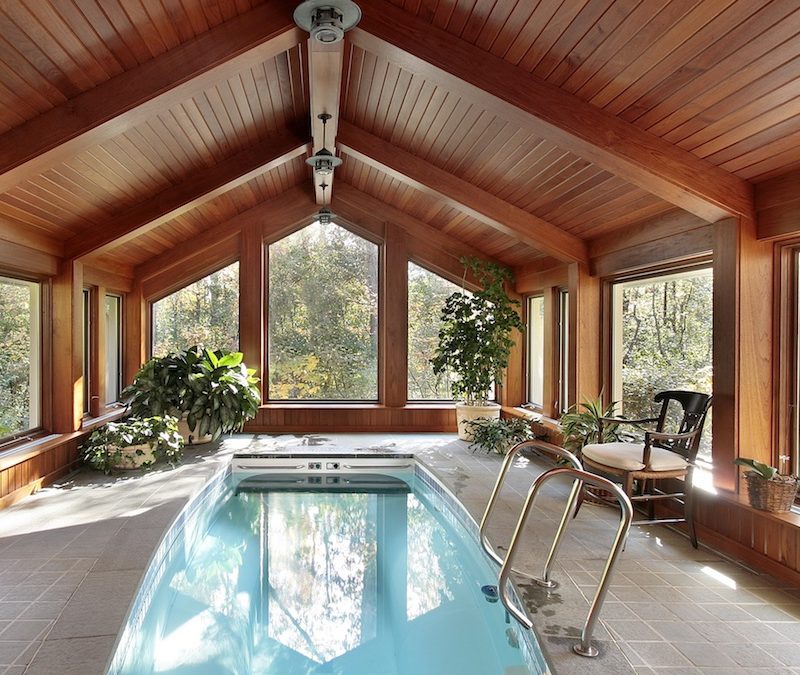Finding the Right Pool Heater to Keep on Swimming
Whether you’re dreaming of a way to extend the pool season or just don’t fancy the idea of jumping into an icy pool, here’s a guide to help you choose the right pool heater for your swimming pool
Whether you want to extend the pool season or just cringe at the thought to diving into a freezing pool, installing a pool heater is a great investment to make.
There are four different types of pool heating systems based on your needs, budget, and the size and location of your house: electric pool heaters, propane or gas pool heaters, solar pool heaters and electric pump heaters. Let’s take a closer look at each one of them.
Type of Swimming Pool Heating Systems
Electric pool heaters
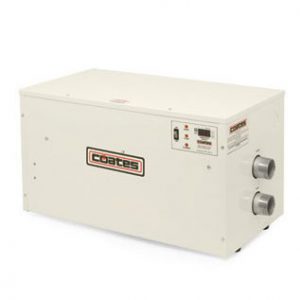 An electric pool heater works on the same principle as how an electric water kettle heats up water. When it’s turned on, an electric current is applied to a series of metal coils, which begins to generate heat energy. As the pool water flows over the metal coils, it absorbs the heat causing it to become warmer. At the same time, the pool water helps cool down the resistors inside to prevent it from overheating so that it can stay open for an extended period of time.
An electric pool heater works on the same principle as how an electric water kettle heats up water. When it’s turned on, an electric current is applied to a series of metal coils, which begins to generate heat energy. As the pool water flows over the metal coils, it absorbs the heat causing it to become warmer. At the same time, the pool water helps cool down the resistors inside to prevent it from overheating so that it can stay open for an extended period of time.
Of the different types of pool heaters out in the market, these are the most affordable, most compact and easiest to install. However, because it’s relatively smaller in size compared to the other pool heating systems, they are best to use for spas and small pool sizes. Since it also runs on electricity, expect that your electricity bill will rise once you start using this.
Gas pool heaters
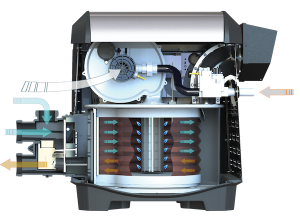 As its name implies, this pool heating system uses either natural gas or propane to heat the pool water as it flows inside through a filter.
As its name implies, this pool heating system uses either natural gas or propane to heat the pool water as it flows inside through a filter.
Gas pool heaters are the most popular and widely used pool heating systems because they can heat up the pool’s water very quickly and they can be used for pools of different sizes. They are also cost efficient to use, especially if you and your family do not use your swimming pool frequently.
The downside of using a gas pool heating system is that its size and efficiency in heating your pool is directly affected by several external factors like your pool size, humidity levels and wind factors in your area. Those that own large size swimming pools and live in dry, windy areas require larger gas pool heaters. Naturally, these would require more significant amounts of natural gas or propane, which can be quite expensive.
Pool heat pump
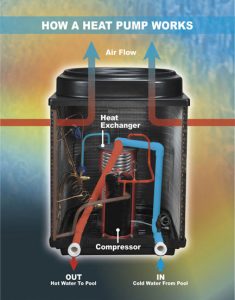
Just like electric pool heaters, heat pump pool heaters need electricity to work. The difference between the two is that heat pump pool heaters do not directly generate heat. As the pool pump circulates the swimming pool water, the water drawn from the pool passes through the pool heat pump. The heat pump has a fan that draws in the outside air and circulates air through the outer evaporator air coil.
Heat pump pool heaters work best for pool owners that live in warm regions and experience mild to tropical climates. They can still work even if the outside air temperature drops. However, it would take longer for it to heat up your pool and would require more electricity to heat it up during the colder months of the year.
Solar pool heaters
Source: Department of Energy
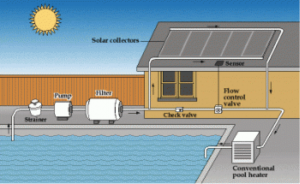 This type of pool heater is increasingly becoming popular among pool owners even though installing it cost more than the other three. For one thing, they rely on the sun for energy, so no fuel is used, making it friendly to the environment. Neither will it cause your home’s monthly electric consumption to rise.
This type of pool heater is increasingly becoming popular among pool owners even though installing it cost more than the other three. For one thing, they rely on the sun for energy, so no fuel is used, making it friendly to the environment. Neither will it cause your home’s monthly electric consumption to rise.
Unlike other types of pool heating systems that are designed just to heat up your pool, many solar pool heater models are equipped with sensors that monitor the temperature of your pool’s water. If these sensors detect that your pool’s water is too cold, it would automatically cause the valve connected to collecting device that heats the water during the day to open to warm up the temperature. However, if the water is too hot, it opens the valve that collects water at night to open, allowing the cooler water to flow.
Choosing the Right Pool Heater
Now that you know the different types of pool heating systems that you can use, the next question is, “which one should I pick?”
To answer that, you need to take into account several important factors:
Location, location, location
Where you live plays an important role when choosing which pool heater to get. That’s because where you live will determine what sources of heat and fuel are readily available and how much heating would you need.
For example, if you live in the south where the temperatures are relatively warmer, a pump pool heater may be your best option. On the other hand, if you live up north, an electric pool heater may be a better choice.
Swimming pool usage
How often you use your swimming pool is another thing to consider. A gas pool heater would be an excellent choice if you only use your swimming pool when hosting a pool party but can be very expensive to use if you swim on a regular basis.
Your pool size
Larger pool sizes would take a much longer time to heat up than smaller pools. That said, it’s also important to make sure that the pool heating system you choose is proportionate to it.
Your budget
When taking your budget into consideration when choosing a pool heater, don’t just stop with just the price of the pool heater. You need to go beyond that. Take into account how much will you spend each time that you heat up your pool, and see if this is something that you and your family will be able to afford.

